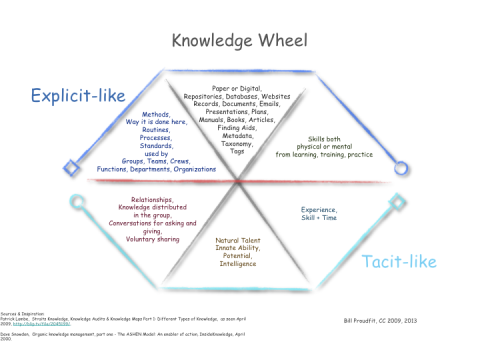Menu

 This posting is derived from an earlier post from my Baoman’s blog.
This posting is derived from an earlier post from my Baoman’s blog.
This is based on a much more simplified version from a Patrick Lambe video on how to conduct a knowledge audit. This wheel also owes a lot to David Snowden’s ASHEN framework but the language has been changed and simplified. I recommend Patrick Lambe’s video highly. My version here grew out of my last project in the MSc programme at HKPolyU. This is my reflection on what I’ve learned about ‘defining knowledge’ which I think is very important if I’m going to go around and talk about ‘doing knowledge management’. I’ve read and heard many knowledge managers say that ‘knowledge’ cannot be defined. That may be a clever thing to say at a conference or in an article or in a blog but it won’t get you very far in the business world when you are trying to get a skeptical senior management team to sign off on a quarter million USD project. A clear definition is an absolute necessity.
The tacit / explicit distinction is now embedded in knowledge management theory. I don’t think the distinction is sufficient for practical knowledge management projects and activities. There is a tension between trying to ‘manage’ all the different kinds of explicit and tacit knowledge. There will always need to be choice on where to put knowledge management effort and it depends on the organization’s goals, resources and abilities. The explicit / tacit distinction is fluid much of the time which is what I’m trying to show with the blurry lines and spaces. Methods and Relationships as well as Skill and Experience are two sides of the same coin. Explicit may not always be as concrete as a document but it could become a document, webpage, recorded talk very easily. Tacit may not be as ephemeral as ideas, thoughts or hunches since many people have very good tools to help them describe and share them with others. The knowledge wheel gives a pretty bumpy ride which is probably true of most knowledge management projects.
Cognitive Edge Ltd. & Cognitive Edge Pte. trading as The Cynefin Company and The Cynefin Centre.
© COPYRIGHT 2024

In knowledge management there is quite a lot of interest and use of anthropological and ...
This continues on from a post in late February when the Toyota quality problem was ...